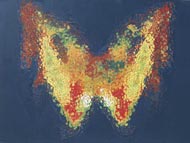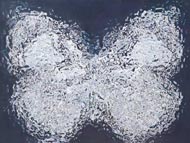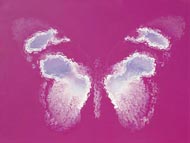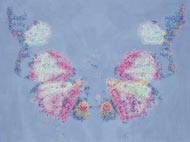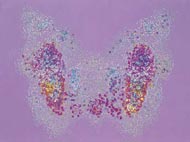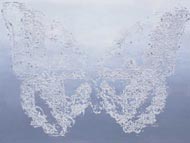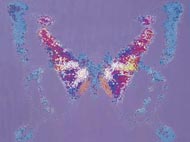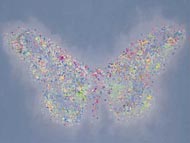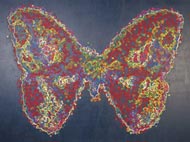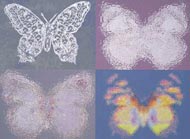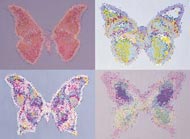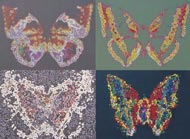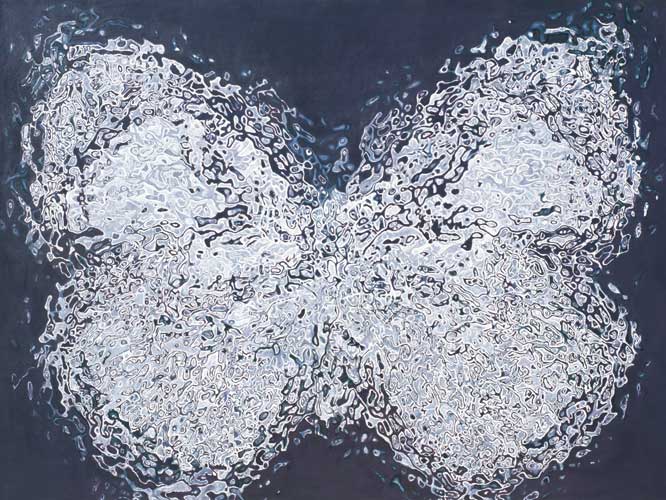
既短暂又多变,既招展又薄脆,既作茧自缚,又破茧而出。 ——萧昱
软蛋也软过,爬来爬去也爬过,装死也装过,做茧自缚的事敢干。解脱自己的事真干,拈花惹草的事老干,扑粉吃蜜的事常干,梦见过庄周,也被庄周梦过,一高兴就出国,动不动就恋爱。翻来覆去,轻灵快活,别因我扎眼就咒我命短,别因我时尚愣怪我肤浅。今年出来一波,明年还得来一波。一波一波一茬一茬,也不全是为了赶时尚。你不知道我是谁,我也不知道你是谁。自己都不知道自己是谁,你还指望我什么。我真不知道我在干什么。 ——萧昱
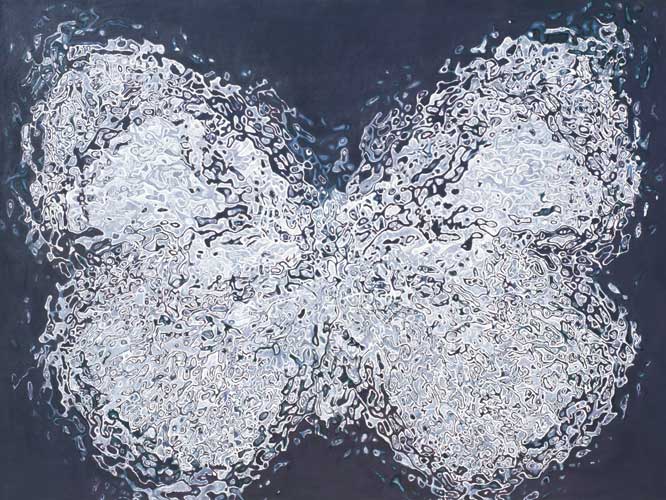
I was once a coward, I crawled here and there, I pretended to be dead, I dared to stew in my own grease. I really did something to free myself and I had many affairs. I dreamed of Zhuangzhou and was dreamed by him. When I feel happy, I go abroad. I frequently fall in love. I drift here and there, free and flexible. Don’t curse me for a short living just because I dazzle your eyes. Don’t blame me shallow just because I am fashionable. The fashion trend changes year after year, but that’s not only for the demand of chic. You don’t know who I am and I don’t know who you are. I even don’t know who I am. What do you expect from me. I really don’t know what I am doing.
——Xiao Yu
- 蝴蝶时代——汪民安
- The Era of Butterfly - Wang Min'an
在萧昱这里,蝴蝶不是出现在婉转低徊的乐音中,不是出现在凄凉的爱情传奇中,不是出现在自然哲学的诡秘中,同样,它也不是出现在它通常置身于其中的自然花草中。相反,萧昱将飞翔的蝴蝶固定下来,将蝴蝶置放在一个单色块的画布上,在此,蝴蝶铺满了整个画面,目之所及,就是一个单纯的蝴蝶,或者,更形象地说,这像是一个钉在画布上的蝴蝶标本,蝴蝶的具体背景被删减了,这样,这就变成了有关蝴蝶的符号。萧昱对蝴蝶的符号精雕细刻,让它异常饱满,让它的细节、神经和身体片断放大,让蝴蝶自身的脆弱之美得以强化。
这样一个蝴蝶,就成为一个图案,它以一种静止的(并非飞行的)形态出现,一种可见性形态出现,一种固定的形态出现,在这样的情况下,蝴蝶脱离了它的具体背景――尽管它栩栩如生,但,它还是置身于一个抽象的时空中,置身于一个无背景、无历史的时空中,这是一个内在性被抽空了的蝴蝶,这样,蝴蝶,在特定情景下的象征意义就被清除了。
不过,这种蝴蝶符号的单纯性,这种具体的象征意义的清除,并不意味着蝴蝶毫无所指,这只是意味着蝴蝶并没有一个单一的所指,相反,一个空的蝴蝶符号,却可能让诸多意义,让各种可能的象征纷至沓来,各种意义都可能灌注在蝴蝶这个单一符号之中――萧昱的工作,正是先破除了加诸于蝴蝶之上的各种具体的单一意义神话,而后却将蝴蝶作为一个自由的空的符号去作为多样意义的载体。一直以来,蝴蝶在中国文化语境中就是一个强有力的表意符号(或许正是这种强大的表意能力,才让萧昱对蝴蝶着迷),只不过是,这个符号通常承载着某个具体意义,通常在一个具体的时空中被赋予一个具体的意义:在某些情况下,它被具体化为自由;在某些情况下,它被具体化为缠绵之爱情;在某些情况下,被具体化为哲学意义上的混沌的物我不分;在某些情况下,具体化为令人心碎的破损之美;在某些情况下,具体化为伤感的死和再生;在某些情况下,具体化为春之破晓;在某些时候则具体化为梦幻之惆怅和惊扰:一个空洞的蝴蝶能指,一旦我们将它置放在一个具体的语境中,它马上就被一个意义所牢牢地捕捉到了。而萧昱正是对此的拒绝――蝴蝶不在语境中,它自在地存在着。面对着萧昱的蝴蝶――这个充斥着整个画面的空的蝴蝶,这个蝴蝶符号,我们赋予它什么意义?
也许,我们可以赋予它上述的任何意义。但是,我们也可以不赋予它任何意义――这是空的意义。蝴蝶,作为蝴蝶形式而存在着,蝴蝶回到了自身,它拒绝任何的表意,一旦剔除了意义的负担,它们就显现为单纯之美――萧昱将这些蝴蝶画得如此之美和细腻,以至于蝴蝶之美似乎能够将蝴蝶天生的表意能力所压制住。不过,萧昱迷恋蝴蝶还另有所图:他试图勾联起那个古老的寓言形式:他在蝴蝶身上发现了自己,同样,也在自己身上发现了蝴蝶。但是,他同那个古老的寓言形式不一样的是,那个古老的蝴蝶之梦是试图消除自身和外物的界线,试图让自身、自然和自由融为一体。而萧昱则是在隐喻的意义上运用蝴蝶的:今天,我们不是变成了蝴蝶,而是像蝴蝶,蝴蝶是我们和我们置身于其中的时代的隐喻――像蝴蝶一样,我们在漂移、变幻、在一个梦幻世界中没有目标地飞翔。像蝴蝶一样,我们如此之易碎,如此之短暂,如此之莫测。萧昱将这个时代理解成蝴蝶时代,将这个时代的人,将他自己,理解成变动不居的蝴蝶,我们这些蝴蝶一般的人在旋转、舞蹈和飞翔,在这个动荡的时刻,飞翔和舞蹈也许并不夹带着欢乐,而是制造了纷乱的碎片。在现时代,我们,这些现代人,这些现代蝴蝶,所感受到的,正如同本雅明描写19世纪的巴黎时所说的,不过是“梦幻世界的灰烬”。
In Xiao Yu’s artworks, butterfly no longer appears elegantly accompanied with mellow melody or in melancholy love legend, let alone in the secret of natural philosophy or fly among flowers. Instead, Xiao fixes his butterfly, and puts it on a self-colored canvas which is fully occupied by the butterfly. Thus it is just a simple butterfly in the stretch of eyes, or in other words, like a specimen of butterfly stamped on canvas. The backdrop of the butterfly becomes blurred. It transforms into a symbol of butterfly. Xiao paints intricately and delicately on the symbol of butterfly, magnifying its details such as nerve and body to make it extremely vivid, which strengthens the fragile beauty of butterfly.
Such a butterfly becomes a visual image through a static, visible and fixed form. Under such condition, butterfly shies away from a certain background, though it is still lifelike. But it is put in an abstract space with no background and history. This is a butterfly being vacuumed with its internality. Thus the symbolic meaning of butterfly has been erased under certain condition.
But the pureness in the symbol of butterfly and the cleanup of it symbolic meaning doesn’t mean that this butterfly doesn’t have no point. It only means that this butterfly doesn’t have a onefold point. On the contrary, an empty symbol of butterfly brings lots of meanings and possibilities that can be all fused into it, that’s Xiao’s job. He first destroys all the detailed onefold meaning and legend on butterfly, then treats butterfly as a freedom and empty symbol to receive multi-meanings. For a long time, butterfly has been considered a strong expressive symbol in Chinese language system (perhaps because of such strong expressiveness, Xiao is enamored with butterfly). Only this symbol sometimes carries certain meaning or being endowed with certain meaning under a certain time and space. In some circumstances, it represents freedom or love, philosophical chaos or heart-broken dilapidated beauty, the sentiment towards death and rebirth or the dawn of spring, and dreamy melancholy and disturbance. Once we put butterfly in a certain detailed language system, it will immediately be fused with certain meaning. But Xiao refuses his butterfly to be put in a certain language system, his butterfly exists freely. However, facing an empty symbol of butterfly that dominates the canvas, what meaning can we endow with Xiao’s butterfly?
Perhaps we can endow with it everything mentioned above, while we can endow with it nothing. This is the meaning of emptiness. Butterfly, as a form, exists. It returns to itself, refusing any expression. Once unburdened with all the meanings, they reflect a pure beauty. Xiao paints his butterfly so intricately and delicately that its beauty seems to overshadow its inborn expressiveness. But Xiao’s fascination towards the butterfly has another purpose: he attempts to relate it with the ancient fable. He finds himself on the butterfly, while at the same time he finds the butterfly on himself. But different from the ancient fable that tries to erase the boundaries between the outside world and oneself or mix self, nature and freedom together, he uses butterfly in a metaphorical meaning. Today we haven’t changed ourselves into butterfly, but we act like butterfly. Butterfly is the metaphor of us and the era that we live in. Like butterfly, we fly in a dreamy world with no direction, we drift and alter; Like butterfly, we are so fragile, ephemeral and profound. Xiao interprets this era as an ear of butterfly, the people living in this era including himself as homeless butterfly. We, butterfly-like people, are swirling, dancing and flying. But these movements are not filled with joy in the chaotic epoch, instead, they arouse fervent fragments. We, modern people, the butterflies of the present era, are just experiencing what Walter Benjamin had described the Paris of the 19th century, “are merely the burning ashes of a dreamy world.”
- 萧昱访谈——艾未未
- An Interview with Xiao Yu - Ai Weiwei
艾未未:《异形与妄想》的展览是在哪儿办的?
萧昱:地下室,反正是99年,98年底推到99年初了。
艾未未:最初你是怎么想做这个的?
萧昱:原来跟孙原合作过那个《羊蝎子》,就是羊脊椎这个东西重新摆放的。我们最初在98年《反视》那个展览上展过,而且很多人都看过。它分两部分,一部分是现场表演。原来是想拍些照片,因为下着雪,不可能有那么多人去看。
艾未未:你们为什么做这些东西呢?即兴的还是…?
萧昱:这个不是即兴的。因为大家都没什么事干,然后我那时候就有一种非常大的冲动,对很多生命的组合开始有些想法。我天天看电视,天天遇到很多事情,有一种无形的社会力量,或者是因为很多人的愿望,想重新组合生命,重新组合人的关系。我甚至觉得包括军队都有一种看不见的意识,一些人组合在一起,在一定程度上过一样的生活,它会对人的心理产生什么作用?或者说当兵的也好,别人看当兵的是怎么样的?我做羊的时候,就找不到一个特别来劲的东西,我只是那么想,就想把它排成队形。我想指的是很淡的,关于生命的东西,不想让人看到羊的原貌,不能把真的羊排成队。如果我强行的把生命的某一个符号,某一部分安放在一起或者重新排列,别人会怎么看我,或者视觉上,感情上会发生哪些变化,这是我不知道的。我只有走到一个不知道的界面的时候,我才觉得这个事情值得我做。我不可以用以往的经验或理论来判断它是对还是错,当时我只是有个质疑,是不是可以这么做?那么艺术家可不可以做这种尝试?做了以后别人会怎么看?就是观众心里头会怎么反应?
艾未未:你的作品当中很大程度上反映了很奇怪的一种状态。说这是变异组合或者是不舒适的状态,这跟你的生活经验有什么特殊的关系吗?
萧昱:特别的地方没有。但是别人经常问你,你老家是哪儿的或者你是哪儿的人?有类似这种情况,我就说不清楚了。你要说祖籍,我是江苏的。但是我跟江苏一点儿关系都没有,我个人情感里没有这个。我在内蒙古长大,然后在北京上学,每年又得回到云南看我父母。
艾未未:是对身份,对位置,对处境的疑惑?
萧昱:对。
艾未未:会不会早晨起来的时候,不知道你是谁?
萧昱:我没有这种感觉。三十岁的时候,我觉得我怎么就三十岁了?而且我在三十岁以前有很多理想,知道自己想干什么。突然那一天我意识到,不知道该干嘛了。我就不知道人活着有什么劲,还真那么想过。
艾未未:有一瞬间想撞墙啊?
萧昱:也没那道理,谁也没惹我没招我,我想这种感觉很多人也许会有过。那个时候也挺乱的,又离婚,又辞职。当时我所作的决定可能就在一瞬间。我辞职就是我坐在办公室,坐着坐着不舒服了。我干了八年老师,甚至在半个小时之前我都没有觉得不舒服,突然在一瞬间不舒服了,而且一秒钟都不想呆了。量可能积攒到一定程度,不见得是因为某一个导火索,只能说当时自己发生了变化,所以马上就找领导说我明天不来了。
艾未未:离婚是怎么回事?
萧昱:那太复杂了。我前面结过一次婚,还牵涉到朋友关系,就是等于我前妻做了一些事情,这个太私人了吧。
艾未未:有什么私人的?
萧昱:我一旦套上一个女人,我对别的女孩没兴趣。我一旦没有女孩的时候,我瞧谁都漂亮。我就是这么一个人,我能把任何一个女孩看出美,但是一旦套住一个,我就全身心的,所以我在她身上花心血特别多。而且那时候特别满足,那段时间我画画从来不参加展览,我八年里任何展览也不参加。
艾未未:我碰到一个女孩说是你的学生嘛?
萧昱:对,我那时候在学校教学。我曾经做过一个实验,让学生听交响乐。我那时候因为自己发烧了,就问他们愿不愿意听交响乐。我其实无所谓,但是我当时能找到的正感兴趣的,就是交响乐。我说你们天天画画烦不烦,愿不愿意一边听音乐一边画画。他们说愿意,小孩都愿意。我说有没有人反对,没人反对。然后我就找了一个录音机,当时手里头正好有交响乐,我就在屋里头放。然后整个学校都乱了套了,但是上课的学生特高兴。后来我问他们“如果你画画特投入的时候,能不能听见音乐?”他们说“听不见了,但是一放松的时候能听见音乐,当真画进去的时候,即使知道有音乐,也没听。”所以那时我就有一种感觉,为什么教学非得在屋里,安安静静的,只听见铅笔的刷刷声呢?然后学校就乱了。先是主任来找我,让我给轰出去了,我说别破坏我的秩序。主任后来告诉校长了,校长拍桌子,跟我说不许你在我们学校做实验,把我们的教学秩序给打乱了。我喜欢干这种事,把他那个秩序给搅和搅和。
艾未未:基本上我看你后来做的鱼呀,树呀,基本上都是对动物的行为或者生命的一种干涉,或者是对它的可能性的解释吧?
萧昱:对。
艾未未:这是你一直的兴趣所在?
萧昱:对。
艾未未:那你自己个人生活还是很正常的。你娶妻、离婚、再结婚,又生孩子,孩子是不是给你带来了极大的兴趣?
萧昱:对,可能正好吻合了某种秩序。在我的个人生活上,实际上我是寻着一个生命快感来走。第二次结婚,我原来的计划里头都没有结婚,但是突然间有了孩子了。莫名的快感,知道自己有孩子了,而且从B超上可以看见,小男孩,心就跳,喝一大瓶可乐,好长时间很激动。再一个问题就很现实,如果你想好好养这个孩子,你就得组织一个家庭。在中国你得合法,孩子不能是黑的,你得考虑他将来受到一个教育,这时候人就变成理性了。这次结婚,说老实话我对这个女朋友特别喜欢,就跟她聊天都乐意,干吗都成。我觉得小孩特神奇,就是一个生命给我意外,我对意外的事情或者不可知的事情出现在我面前,就觉得特别愉快。因为生孩子对我来讲, 这个东西可能大到把很多辛苦给盖掉了,那些对我来讲,挺有意思,带来很多快感,很意外。比如说他突然间说话了,或者他对你的很多事情有反应了,就会给你带来对生命的感觉。
艾未未:那现在对你来说是最满意的一段生活了,孩子、家、作品?
萧昱:对,如果跟以往比较是比较满意的一段。
艾未未:更踏实了?
萧昱:如果说情感上有踏实的一面,但别的方面还是焦虑。你要说情感上,爱情上是非常美好的一段。但有时候开始想自己是怎么回事的时候,就特焦虑。我不知道我将来的路应该怎么走,我不知道艺术家应该是什么样的,或者说我是不是应该接着做艺术家,还是干什么。
艾未未:这都无所谓了?
萧昱:对,实际上是这样。但问题是,我以前认为干什么就是什么,现在遇到这个问题,又有一个质疑,我到底是干什么呢?
艾未未:这个和你一直对身份的渴望还是有关的,你本身是处在一个疑惑,无法界定这两者之间?
萧昱:有时候走着走着会发现不知道自己是谁了。你说你痛苦吧,你觉得生活一团糟。当你生活很满足的时候,你同样会发现。你去参加这种展览那种展览,你还觉得你不知道是怎么回事。而且我的想法有时候会特飞,我刚才跟你说那方案,我不在做,但我想得飞的乱七八糟的。如果说可以跟生活挂上边儿的话,就是我做了一个VIDEO。这个VIDEO从方案这点上看还是比较理智的。我先拍他(我儿子),按照这个思路拍,拍完了以后,就把这个摄像机给他。他根本不知道这是摄像机,不知道是什么功能。从这个角度来讲,实际上是否定了我刻意拍的一个录像,然后经过剪接以后给别人看。我拍完了以后把这个摄像机给他,他就开始玩儿,在展厅里头。我设定的还是一个关于艺术的前题,他就开始玩这摄像机。因为摄像机的镜头上能看见自己个儿,他亲摄像机,他在地上转,他蹲在那儿转,摄像机就把一切拍下来了。然后我回家放到机器里,装在电脑里,我就先看我前头的东西,再放他这一段儿。跟我预料的一样,我前边所有拍的一切都是狗屁,我就一刀剪掉,就把他这段作为完整的作品,我所做的技术就是把声音处理一点点,让人看着舒服点儿,没有做其它的剪接。因为我觉得他拍得本身里头具备所有的技术,比如时空的,比如他把这镜头吧唧放地上了,就是一个黑场,符合所有的一切,但是他根本就没有技术。
艾未未:这个作品游戏性很强?
萧昱:我觉得实际上还是跟我有一点儿关系,因为他是对一个现有秩序的质疑。我现在到外面去参加展览,看到百分之三十的作品都是VIDEO,做的精细之极。就有点儿像看电视剧,看到开头我就知道结尾,有的时候太熟悉了,技术很多。我就开始怀疑,这么多的技术在做VIDEO,它这里面到底有什么?我能干什么?关于现在正在形成的秩序,我有点儿质疑。我把这个摄像机给一个孩子,而且这个孩子丝毫不知道是在做作品,他也不知道是在有意识地做技术。这东西放出来以后吧,人家有兴趣看, 这是很奇怪的事情。
艾未未:你的作品,你感兴趣的东西,跟你在中国的经验有很直接的关系吗?就是作为中国性的作品,一个中国的艺术家无论到哪儿展览,也很成功,你觉得有关系吗?
萧昱:客观是有关系的,但是我没想过这事儿。我自己想作品的时候,我没想到国籍。但它肯定会在我血液里或者民族性里头,如果谈有这么个事儿的话可能会有。但是这个作品拿出去很新,很明显,就是你关心的和人家关心的不一样。我觉得从这点上很客观的看,一看就是大陆的人做的。
艾未未:实际上从你的作品中我是看不到什么东西的?
萧昱:我发现他们很多人,说一看你这个作品,不知道是真的假的,但我觉得至少从客观上看,兴趣点还是有区别的。这次再做这个展览,里边百分之八十是VIDEO,而且这个VIDEO一放的时候,年轻人喜欢,就是那种比较适合学校的。
艾未未:你说的卡塞尔是吧?
萧昱:不是,是俄罗斯这个。所以这个特别逗,而且从我这个作品中你随时能看到好玩儿的,能吸引眼球,我觉得我要的是这个。然后所谓的批评家评论说,你这个作品最好,艺术学院的学生也喜欢。但是很鲜明,在这件VIDEO里面你一看就知道是中国人做的东西。
艾未未:那什么是中国人做的?
萧昱:有的时候我觉得中国人对自身处境啊,还有身份啊,还有自己的符号关心的更多一点。
艾未未:你觉得这种所谓中国的东西会因为时间而改变吗?
萧昱:说句实话我根本不在意,而且我对什么是中国的东西,我说不好。你要不问我,我没好好想,你再这么问下去,等于折磨我。
Ai Weiwei: Where were “Singularity and Delusion”?
Xiao Yu: They were displayed in a basement and lasted from the end of 1998 to the beginning of 1999.
Ai Weiwei: What prompted you?
Xiao Yu: I originally cooperated with Sun Yuan to reform the sheep scorpions. The artwork was exhibited in 1998 and many people saw it. The art piece was actually divided into two parts, including one on-site performance. I planed to take some photos, as there weren’t many visitors due to the heavy snow.
Ai Weiwei: Why did you create these things? Were they spontaneous or?
Xiao Yu: This is not spontaneous. Because we had nothing to do at that time, so I had a strong rush. There were many combinations of the living during that period, which inspired me some of the ideas. I watched television and encountered lots of things everyday. There existed an invisible power or the hope of many – to reform the living and the relationship among human beings. I even thought there was some invisible consciousness in the army. Just think a group of people were arranged together and led a same life, how would such life style affect on their psychological feelings? In other words, how those soldiers would be viewed in the eyes of others? When I was making the sheep scorpion piece, I was not able to find something to excite me. I just thought that way, and lined them in queue. What I pointed out was quite weak, something related to the living. But I neither wanted people to see the original outlook of the sheep nor was able to line the real sheep in queue. If I compelled a certain symbol of a part of the living to be put together or reformed, what would others think of me? Or what will it affect in the visual or passion areas? This is something beyond my approach. I only find out this worth doing when I come up to an unknown phase. I can’t judge whether it’s wrong or not just based on the past experience or theory. I was just questioning at that time whether this was feasible. Then can artists try such experiment? What will others view them after doing that? How will the viewers respond in their heart?
Ai Weiwei: Your artworks reflect a quite bizarre scene that could be said as an aberrant form or an uncomfortable status, do they have any particular link to your personal living experience?
Xiao Yu: Nothing particular. But I am often asked the same question, like where is your hometown or where were you from? I feel hard to give a clear answer. My ancestors used to live in Jiangsu province, so I am from Jiangsu. But I hardly have any connection with Jiangsu, let alone my emotional attachment. I grew up in Inner Mongolia and I furthered my study in Beijing, every year I go to Yunnan to visit my parents.
Ai Weiwei: Perplexed with your identity, location and condition?
Xiao Yu: Yes.
Ai Weiwei: Did you wake up one morning and lost in whom you are?
Xiao Yu: No, I didn’t. When I was thirty, I felt quite strange how I had already aged 30. Before 30, I had many ideals; I knew what I wanted to do. Until that day did I realize suddenly that I didn’t know what to do. I didn’t understand the meaning to live, really.
Ai Weiwei: Has there been such a moment that you wanted to bump yourself into the wall?
Xiao Yu: No, it was unreasonable as there were nobody to blame. I bet many people felt the way just like me. My life was a bit chaotic, and the decisions of divorce and resignation were all made upon a fleeting moment. For example, when I sat in my office one day I decided to resign. I suddenly felt upset. I had been a teacher for eight years, and even half an hour ago everything was fine. But it was totally not fine for me at that particular moment. I could barely stay here for another second. So I resigned. Once quantity accumulates to a certain degree, sometimes even without a fuse, like me, I could only say that I was unexpectedly changed at that moment. I found my boss immediately and told him I wouldn’t come tomorrow.
Ai Weiwei: What about your divorce?
Xiao Yu: That was too complicated. I married before. It involved my friend and my ex-wife did something, but that's too personal.
Ai Weiwei: Do you call it personal?
Xiao Yu: When I am addicted to a girl, my eyes see no other girls. But if I don’t, every girl is Venus in my eyes. I could find the beauty in any girl. But when I am addicted to somebody, I put all my heart and soul on her. At that time, I was extremely satisfied. I was painting but I didn’t attend any exhibit for eight years.
Ai Weiwei: I met a girl who said she was your student.
Xiao Yu: Yes, I was teaching at that time. I did an experiment. I let my student listen to the symphony. Perhaps I was in a feverish status myself at that time. I asked them “Do you want to listen to it? It doesn’t matter to me.” I was able to find something that I was interested then -- it was symphony. I asked them “Are you bored to paint everyday? Do you want to listen to the symphony while painting?” They said yes, I guess every young person would say so. I asked if anyone objected. No one. Then I found a tape-recorder and several symphony tapes at hand, I played it in the classroom. The whole school was in a chaotic condition, but the students in the classroom were extremely excited. I asked the students “When you totally engaged in the painting, can you hear the music” They replied “No, but when we are relaxed, we could hear the music. When we are totally engaged in the painting, we know there is music, but we don’t listen to it.” Then I thought why teach must be conducted in the classroom silently with only the scratches of pencil. The school was out of control, so the director found me, but I drove him off. Then he told the president who was irritated and forbid me to try an experiment in his school. “You destroyed our discipline.” But I enjoyed doing such kind of thing, like destroying his discipline.
Ai Weiwei: The later fish, tree you did are almost the intervention of the living, the animals’ act, or their possible explanation.
Xiao Yu: Yes.
Ai Weiwei: This is always your interest?
Xiao Yu: Yes.
Ai Weiwei: Your personal life sounds quite normal, you married and then divorced, remarried and have a child. The birth of your child brings you the greatest fun?
Xiao Yu: Right, it perfectly matches certain order. In fact, I have always pursued the happiness of the living in my personal life. I didn’t have any plan to get remarried. But suddenly we had our child. I felt exhilarated to know that I would be a father. I saw him on the ultrasonic graphic and he was a boy. My heart beat fast, and I emptied a bottle of Coca Cola. Then the question became more realistic. If you want to raise a child, you have to give him a family. He must be legal in China and you have to consider the education he will receive in the future. Then I became rational. I love my present wife dearly when she was still my girl friend. I like to chat with her or do everything shared with her. I find my son a miracle, a surprise. I was extremely happy to see those unexpected or unknown things in front of me. Raising a child is a tough job, so tough that it almost overshadows tough itself. But for me, such toughness is quite meaningful and brings lots of funs. For example, he suddenly said something or started to respond with you, which gave you some feelings towards the living.
Ai Weiwei: You are more satisfied with your present life, you have your child, family and artwork?
Xiao Yu: Yes, if you compared it with the past.
Ai Weiwei: More to the “ground”?
Xiao Yu: But I am still upset. With regard to emotion, love is a series of beautiful moments. Sometimes when I start to think what is happening, I become quite upset. I don’t know where my future path will be. I don’t know what artists should be. I have no idea whether I should continue to be an artist or do something else.
Ai Weiwei: That doesn’t matter?
Xiao Yu: Yes. But the question is I thought one’s identity was based on what he or she was doing before. But now I have such question for me, what am I doing?
Ai Weiwei: This is linked with your desire to identify yourself. You are still in a perplexed condition, hard to define.
Xiao Yu: Sometimes you don’t know whom you are when life goes on day by day. You feel painful and find life a total mess. But even when you are satisfied with life, you still face the same agony. You join different exhibitions from time to time, and you still don’t know what’s going on. Sometimes my mind moves fast. I talked to you about my plan a moment ago. Although I am not doing it right now, my mind moves wildly. I did a video that I thought might be related to life. I captured my son. After the shooting, I gave the camera to him. He didn’t know it was a camera let alone its function. My intention of purposely doing a video and then screen it to others after the editing failed. He started to play with the camera inside the exhibition hall. I set an art premise. The boy could see him in the camera lens, then he kissed it and swirled it on the ground. He squatted on the ground and swirled the camera that recorded everything. When back home, I played it in the computer. I saw what I captured and then what he captured. As I expected that what I captured, if compared with his, was a total bullshit. I cut mine and made some little technical changes of the sound for what he captured. The small changes simply made it more comfortable to please the eyes without any further editing. Because I found what he captured including all the techniques, such as time and space. For example, he immediately dropped the camera on the ground, just like an empty black shot. It meets everything that technique demands, but he didn’t use technique at all.
Ai Weiwei: It is imbued with a strong game flavor?
Xiao Yu: Actually I find it is related to me, as he aims an existing system. The 30 percent of the artworks shown at the exhibitions that I frequent are video, all delicately done. They are somewhat like the abundant television series, from the very start, I could guess its ending. Sometimes they are too familiar with too much technique. I started to doubt why there was so much technique in it. What’s the use? What can I do? I began to doubt the existing system. I handed over a camera to a child who didn’t have the least idea of that he was doing an art piece. Furthermore, he didn’t know he infused technique in it. But when it is screened, nearly everyone is interested to see this video. This is quite strange.
Ai Weiwei: Your artwork or what you are interested directly link with your experience in China? A Chinese artist bringing those artworks stamped with Chinese characteristic is successful wherever he or she holds an exhibition. Do you find any liaison between the two?
Xiao Yu: Objectively yes. But I didn’t think of it. When I am thinking of my artwork, I don’t think of my nationality. But it must be deeply rooted in my blood or nation. It might have some liaison. The work you presented is new and obviously what you concerned is different from the others. Objectively speaking, this could be easily looked through that a Chinese mainland artist did it.
Ai Weiwei: In fact, I can’t see it through your artworks.
Xiao Yu: Many people told me that they didn’t know whether it was real or fake through my artworks. In fact, we have different interest. This exhibition includes nearly 80 percent of video. When this video is screened, young people from the art academies especially like it.
Ai Weiwei: You mean Kassel?
Xiao Yu: No, the one in Russia. It is very funny, as the visitors could find funs when viewing from any period of the video. It really catches the eyes. I feel that is what I want. Then the so called art critics said “your video was the best and favored by students from the art academies.” But obviously, it is easy to tell that a Chinese artist did the video via its contents.
Ai Weiwei: What are Chinese doing?
Xiao Yu: Sometimes I feel that Chinese are concerned with their conditions, identities and personal symbols.
Ai Weiwei: Do you think that these “Chinese things” will change when time flows?
Xiao Yu: Frankly speaking, I don’t care it at all. I am not able to tell what Chinese things are. If you don’t ask me, I won’t think of it. But if you continue to ask me, the question equals a torture to me.
